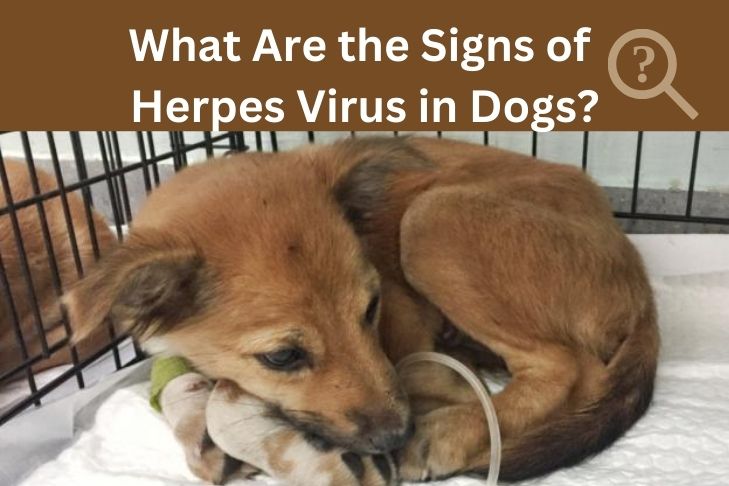Herpes virus is a term that often brings concern to dog lovers, and rightly so. While the herpes virus in dogs is a different strain than that which affects humans, it can still cause significant health issues for your beloved pet.
Knowing how this virus affects dogs, the symptoms to watch out for, and the available treatments can help you take the best possible care of your furry friend.
So, let’s take a plunge into it!
Can Herpes Virus in Dogs Be Cured?

One of the first questions that dog parents often ask is, “Can herpes in dogs be cured?” Sadly, the herpes virus in dogs has no cure just like in humans. Once a dog is infected, the virus remains in their system for life, often lying dormant and only causing symptoms during periods of stress or illness.
However, there are treatments available to manage the symptoms and reduce the impact of the virus on your dog’s health.
Must Read: Learn about the parasites in dogs
Herpes Virus in Dogs: Can Your Canine Be Survived?

The answer is yes, most dogs can survive a herpes infection, especially if they are otherwise healthy. In adult dogs, the virus usually causes mild symptoms that can be managed with proper care and treatment.
However, the herpes virus in puppies is particularly dangerous, especially for those under three weeks old. In puppies, the virus can cause severe respiratory and neurological symptoms, which can be fatal if not treated promptly.
Adult dogs with a herpes infection generally lead normal lives, although they may have occasional flare-ups, particularly during times of stress or if their immune system is compromised. Regular veterinary check-ups and a healthy lifestyle can help manage the virus and ensure your dog remains as healthy as possible.
What Are the Signs of Herpes Virus in Dogs?

Recognizing dog herpes symptoms is crucial for early intervention. In adult dogs, symptoms can vary widely and may include:
- Respiratory problems like cough and sneezing
- Eye diseases in dogs, like eye inflammation or conjunctivitis
- Lethargy and general malaise
- Genital lesions or sores
- Fever
In puppies, the symptoms are more severe and can include:
- Difficulty breathing
- Crying and restlessness
- Weakness or lethargy
- Lack of appetite
- Neurological symptoms such as seizures
It’s important to note that some big fluffy dogs may carry the virus without showing any obvious symptoms, making it even more crucial to be vigilant, especially if you have a breeding dog or puppies.
What causes Herpes Virus in Dogs?

Understanding how dogs get herpes is key to preventing the spread of the virus. Canine herpes is most commonly spread through direct contact with an infected dog, particularly through bodily fluids such as saliva, nasal discharge, or genital secretions.
Puppies can also contract the virus from their mother during birth or shortly after, through contact with the mother’s genital secretions.
Dogs are most vulnerable to infection in kennels, breeding facilities, or places where they come into close contact with other dogs.
To minimize the risk of transmission, it’s essential to practice good hygiene, especially in environments where multiple dogs are present. Regular veterinary care and testing are also crucial, especially for breeding dogs.
How Do You Test for Herpes Virus in Dogs?

If you suspect your chunky dog might be infected with the herpes virus, how do you test for canine herpes?
Your veterinarian will likely conduct a series of diagnostic tests, including blood tests, swabs of the affected areas (such as the nose, eyes, or genital area), and possibly even a PCR test to detect the virus’s genetic material. Early detection is key to managing the virus and preventing it from spreading to other dogs.
Treatment for Herpes Virus in Dogs

While there is no cure for herpes in dogs, there are various treatments for herpes virus in dogs that can help manage the symptoms and improve your dog’s quality of life.
These treatments may include antiviral medications, immune system support, and symptomatic care such as eye drops for conjunctivitis or antibiotics for secondary bacterial infections.
In puppies, supportive care is critical, including keeping them warm and ensuring they are well-hydrated and nourished. If the condition gets severe, you might need to hospitalize your dog for better care.
Also Read: Glyphosate Toxicity Dogs Treatment Options
Wrapping Up!
The herpes virus in dogs is way more serious than thought of, especially for puppies. While it cannot be cured, with the right care and management, most dogs can live normal, healthy lives even after contracting the virus.
Understanding the symptoms, transmission, and treatment options will help you take the best possible care of your dog and protect them from the harmful effects of this virus. Always consult your veterinarian if you suspect your dog may have herpes, and follow their advice closely to ensure your dog’s well-being.




